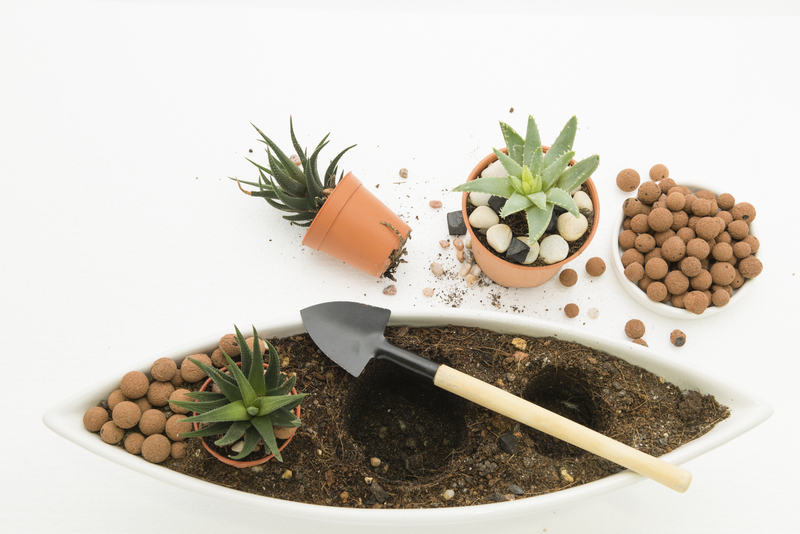From Waste to Abundant Soil
Posted on 09/09/2025
From Waste to Abundant Soil: Transforming Organic Refuse into Nourishing Earth
Modern life produces a staggering amount of organic waste, often destined for landfills. But what if these discarded scraps could be transformed into an invaluable resource? Turning waste into abundant soil is not only possible, but it's also essential for sustainable agriculture, gardening, and environmental health. This comprehensive guide explores how organic waste metamorphoses into rich, fertile soil, detailing processes, benefits, methods, and practical steps for beginners and seasoned composters alike.
What Does It Mean to Convert Waste to Soil?
The journey from waste to abundant soil starts with understanding what soil transformation entails. At its core, this process leverages nature's decomposition cycles. Dead plant matter, food scraps, yard clippings, and other organic refuse break down, thanks to the action of microbes, worms, and fungi. The result? Compost -- a dark, earthy, nutrient-dense material that enriches soil health and aids plant growth.
- Waste -- Includes kitchen scraps, yard waste, leaves, coffee grounds, and more.
- Composting -- A controlled process fostering the decomposition of organic materials.
- Abundant soil -- The end product, teeming with nutrients, minerals, and beneficial organisms essential for gardens and farms.
Why Turning Waste into Abundant Soil Matters
The transformation of organic waste into fertile soil significantly impacts the environment, economy, and food systems:
- Reduces landfill usage: Landfills are overburdened with waste, especially organic matter. Composting lessens this strain and lowers greenhouse gas emissions.
- Builds healthier soil: Compost boosts soil structure, water retention, and microbial diversity, resulting in better crops and gardens.
- Mitigates climate change: Diverting organic matter from landfills prevents methane production--a potent greenhouse gas.
- Encourages circularity: Converting waste into soil creates a natural, closed-loop system, reducing the need for synthetic fertilizers.

Types of Waste Suitable for Soil Enrichment
Not all waste is created equal. For successful waste-to-soil transformation, understanding suitable materials is crucial. Here's what you can and can't compost:
Green Materials (Nitrogen-rich)
- Vegetable and fruit peels
- Coffee grounds and tea bags
- Fresh grass clippings
- Plant trimmings
Brown Materials (Carbon-rich)
- Dry leaves
- Wood chips and sawdust (untreated)
- Cardboard and paper (uncoated and shredded)
- Straw and hay
Items to avoid: meat, dairy products, oily foods, diseased plants, pet waste, and synthetic materials. These can attract pests, introduce pathogens, or disrupt the composting process.
How Waste Becomes Abundant Soil: The Composting Process Explained
The Science Behind Composting
Composting is a biological process where microorganisms (such as bacteria and fungi), as well as larger organisms like earthworms, break down organic matter. They thrive in environments with the right mix of carbon (browns), nitrogen (greens), moisture, and oxygen.
- Stage 1 -- Mesophilic phase: Moderate temperatures enable rapid breakdown of easily degradable compounds.
- Stage 2 -- Thermophilic phase: Heat-loving microbes further decompose tougher materials, killing most weed seeds and pathogens.
- Stage 3 -- Maturation phase: The pile cools and stabilizes, resulting in mature, nutrient-dense compost.
Composting Methods: Which One Fits Your Needs?
Several techniques can help you transform waste into fertile soil, depending on your space, time, and climate.
- Backyard composting: Traditional, pile-based or bin composting suitable for most households.
- Vermicomposting: Uses red wiggler worms to decompose food scraps, ideal for apartments or limited spaces.
- Bokashi: An anaerobic, fermentation-based method for fast breakdown, even of small amounts of dairy and meat.
- Tumbler composting: Enclosed bins on a rotating drum, facilitating speedy and easy turning.
- Community composting: Shared resources for those without backyard space.
The Benefits of Creating Soil from Organic Waste
Let's explore the broad-reaching advantages of turning waste to abundant garden soil:
1. Enhanced Soil Fertility and Structure
- Nutrient supply: Compost feeds soil with essential macro- and micronutrients for vigorous plant growth.
- Improved texture: Organic matter helps sandy soils retain water and lightens heavy, clay soils.
- Boosted biological activity: Beneficial microbes outcompete plant pathogens, support nutrient cycling, and promote robust root systems.
2. Water Conservation and Erosion Control
- Increased water retention: Soils amended with compost absorb and hold water, reducing irrigation needs and runoff.
- Erosion resistance: Stronger soil structure helps prevent degradation from wind and rain.
3. Environmental and Climate Advantages
- Carbon sequestration: Soils rich in organic matter store carbon, helping mitigate atmospheric CO2 levels.
- Reduced chemical dependency: Home-grown compost replaces factory-made fertilizers, minimizing pollution and resource extraction.
4. Economic and Community Benefits
- Lower waste disposal costs
- Healthier homegrown produce
- Local job creation through composting initiatives
Getting Started: Step-by-Step Guide to Making Abundant Soil from Waste
Ready to transform kitchen scraps and yard clippings into rich, productive soil? Here's how:
1. Choose Your Composting Site and Method
- Outdoor: Select a well-drained, partially shaded spot for a compost pile or bin. Ensure easy access year-round.
- Indoor: Use a vermicomposting bin for small spaces or Bokashi for odor-free, compact fermentation.
2. Start Layering Waste Materials
- Begin with coarse browns at the bottom for airflow -- sticks, straw, dry leaves.
- Alternate layers of green (nitrogen) and brown (carbon) material to optimize decomposition.
- Add moisture, ensuring the pile is damp but not soggy (like a wrung-out sponge).
3. Maintain Balance and Aerate
- Turn the pile every 1-2 weeks to provide oxygen, speeding up the breakdown process.
- Monitor temperature and moisture -- a hot pile (120-160?F) is a sign of happy microbes.
4. Harvest Your Finished Compost
- Timeframe: Compost matures in as little as 2-4 months (hot composting) or up to a year (cold composting).
- Appearance and smell: Finished product is dark, crumbly, and earthy-smelling -- no trace of the original waste.
Advanced Tips for Superior Waste-to-Soil Results
- Chop scraps smaller to accelerate decomposition.
- Control pests by always covering food waste with browns and avoiding attractants (meats, oils).
- Add compost activators like finished compost, aged manure, or commercial starters to boost microbial activity.
- Monitor pH: Aim for neutral (6.5-7), adjusting ingredients as needed.
- Explore sheet mulching (lasagna gardening) as an in-situ method for turning waste into garden soil directly.
Common Problems and How to Solve Them
While composting is simple, you may encounter some hurdles during the conversion of organic waste to vibrant soil:
- Bad odors: Usually caused by too much green material or excessive moisture. Solution: Add more browns and fluff the pile.
- Slow decomposition: May result from dryness, lack of nitrogen, or insufficient airflow. Solution: Add water, more greens, and mix regularly.
- Pests: Attracted by animal products or uncovered food. Solution: Exclude meat, dairy, and always cover fresh waste with carbon-rich materials.
Success Stories: How Communities Transform Waste into Abundant Soil
Across the globe, cities and rural areas alike demonstrate the benefits and scalability of diverting waste from landfills to create abundant soil:
- San Francisco, USA: Pioneered a mandatory composting ordinance, turning vast amounts of restaurant, home, and business waste into soil for local vineyards and parks.
- Bangalore, India: Grassroots movements encourage home and apartment composting, reducing city landfill burdens and producing nutrient-rich compost for urban farmers.
- France's "Gardeners of Paris": City-supported initiatives offer composting stations and soil amendments for community spaces, food gardens, and suburban vineyards.

From Waste to Abundant Soil: FAQ
Is composting safe?
Yes, as long as proper materials are used and the pile is managed appropriately.
How much compost do I need for my garden?
A 1-2 inch layer worked into the topsoil annually is generally sufficient for most gardens.
Can I compost during winter?
Absolutely! Decomposition slows but continues, and the pile "wakes up" with warmer weather.
Conclusion: Embrace the Cycle -- Your Waste, Our World's Abundant Soil
Converting waste into fertile, life-giving soil is within everyone's reach. Whether you have a sprawling yard or a tiny kitchen, the journey from refuse to resource starts with a single step. Each bucket of food scraps or armful of autumn leaves added to a compost pile not only creates abundant soil but also nourishes the earth, supports local food systems, and combats climate change.
Join the growing movement. Start small, experiment, and enjoy the transformation from waste to abundant soil--a process that is as old as Earth itself and as vital to our future as ever.
```Latest Posts
Elevate Your Garden Appeal with Expert Seating Tips
Practical Solutions to Keep Your Garden Safe in Harsh Weather
Green Thumb Tips for a Blooming Herb Sanctuary

